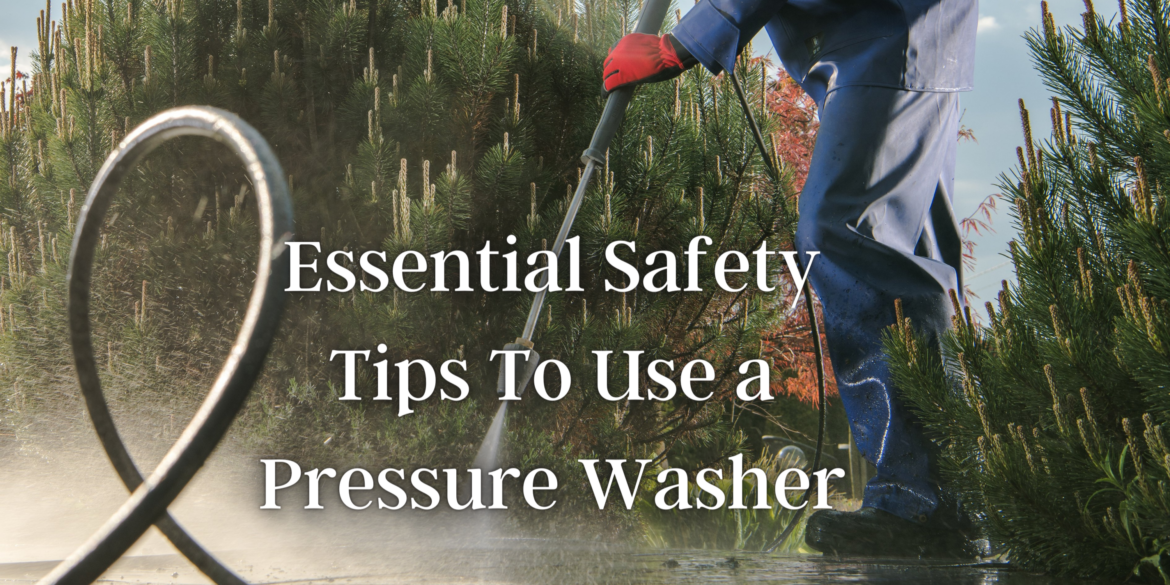If you don’t use a pressure washer properly, you might end up with a severe or fatal injury.
Pressure washer safety is no laughing matter. The unfortunate reality is that most pressure washer accidents are entirely preventable. Don’t be a fool. You shouldn’t wear floppy flops and use the pressure washer like a super soaker just because you’re at home…
Although a grandfalls power washer does not have the same high pressure as a grease or paint gun, the PSI is sufficient to inflict significant injury.
Let’s take a closer look at why you should be cautious and the seven pressure washer safety recommendations that will help you remain safe.
Why Should You Use Caution When Using a Pressure Washer?
Take 5 minutes before starting the work to think about the task, identify the dangers, and determine ways to reduce the risks.
Take a 5-minute stroll around the area you’ll be cleaning and ask yourself the following questions:
Do I feel prepared and capable of completing the assignment today? Did you go to the gym yesterday and feel exhausted? Have you had a late night and are tired?
Is today’s weather suitable for pressure washing? It’s not a good idea to power wash in the rain or when there’s a lot of wind.
Is the location free of dangers?
Toys, motorcycles, cats, and even trees may appear out of nowhere while you’re focused on your work.
Is it safe to spray near electrical outlets, open windows, or home vents? To avoid damage from the water spraying, wrap electronics in plastic, block windows, and cover vents.
Do I know what to do if the pressure washer begins to make strange sounds, leaks, or begins to smoke? Make sure you have a plan in place for what to do if the unexpected occurs.
Is it true that I’m sufficiently safeguarding myself? Wear the appropriate personal protection equipment.
How am I going to be hurt?
Make a list of all the ways you may be wounded while pressure washing today—everything from tripping to falling down the stairs to being hit by an automobile.
What can I do to make sure I don’t get hurt? First, consider the threats you identified and how you may prevent them from occurring.
Put on the proper personal protective equipment (PPE).
It’s amazing how many injuries may be avoided with adequate PPE. Even if there are no laws at home, steel toe boots and other protective gear should be used.
Here’s what you should do:
Goggles or safety glasses are recommended. This is such a no-brainer. Flying bullets will not enter your eye if you use proper safety glasses. This is a fundamental risk reduction that you must undertake when dealing with high-pressure water washing dirt and debris off surfaces.
Another straightforward implementation. At the very least, you should wear steel-toed gumboots or work boots. Worst case scenario, wear enclosed running shoes.
The hand is the most frequent site of injection injuries. Wear the appropriate safety gloves.
Ear protection is required. This is especially important if you want to use a gas-powered pressure washer for a lengthy period. Electric pressure cleaners eliminate the need for this.
There will be debris flying all over the place. Even if it’s hot outdoors, wear pants to protect your legs.
Before using the pressure washer, read the User Manual thoroughly.
Each pressure washer is unique in its way. There are belt drive, direct drive, hot water, and cold water options in addition to gas and electric.
Your User Manual will walk you through all you need to know about running your equipment, including troubleshooting techniques and machine-specific safety precautions.
Use a gas pressure washer in a confined location only if necessary.
There are two reasons why a gas power washer should not be used in enclosed structures:
Toxic exhaust emissions. Carbon monoxide is emitted by your gas power washer engine, which may induce nausea, dizziness, and headaches if inhaled in large amounts. Make sure you only pressure wash in well-ventilated areas to prevent this problem.
There’s more noise now. A petrol pressure cleaner has a tiny engine comparable to a lawnmower and is just as noisy. Because the compact space magnifies the sound, it will be significantly louder in an enclosed location. To prevent hearing loss or injury, use ear protection.
Be alert of your surroundings when cleaning.
Playing children, dogs, passing automobiles, slick surfaces, and electrical wires and power lines should all be avoided.
Although these dangers should have been identified during your 5-minute pre-job study (Pressure Washer Safety Tip #1), circumstances change, and new hazards might arise.
Start washing 2-feet away from a test surface with the widest angle spray tip and adjust the nozzle and distance as required.
Pressure washers come with 4-5 different kinds of spray nozzles out of the box:
Start by pressure washing a test surface and holding the spray a few feet away from the area to avoid damaging the surface. If it cleans, everything is well. Next, start bringing the rush closer if it isn’t already. Never go closer than 6 inches to a person. If you reach 6 inches and the power isn’t sufficient to clean the surface effectively. Finally, rep the procedure with the appropriate nozzle.
Avoid using ladders or operating at heights.
Nothing is more complicated than pressure washing from a height. So what’s the point of creating a hazard? If you fall in the wrong direction and strike your head, a 3-foot fall may be lethal. Keep your feet firmly planted on the ground and use an extension wand.
